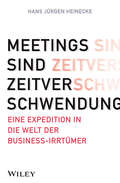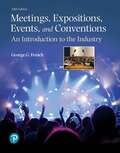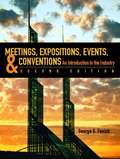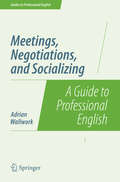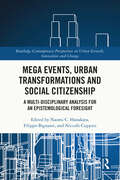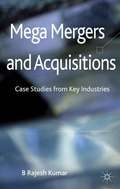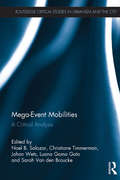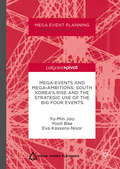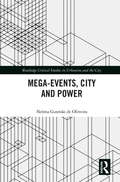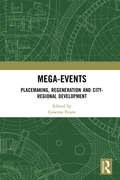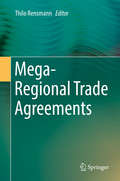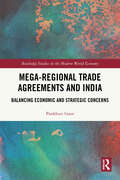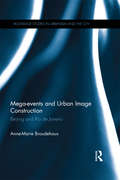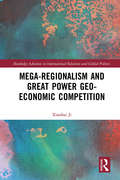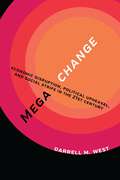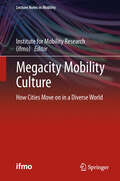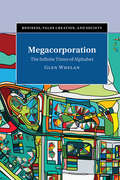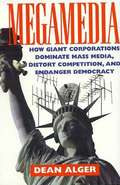- Table View
- List View
Meetings sind Zeitverschwendung: Eine Expedition in die Welt der Business-Irrtümer
by Hans Jürgen HeineckeIrrtümer sind unterhaltsam, jedenfalls die anderer Leute. Viel mehr als nur amüsante Munition für Besserwisser bietet der Management-Coach und Querdenker Hans Jürgen Heinecke in seiner Sammlung der hartnäckigsten Business-Irrtümer. Scharfsinnig und voller Esprit hinterfragt er Glaubenssätze, die die Wirtschaftswelt prägen - oft mit fatalen Konsequenzen. Sind Meetings wirklich Zeitverschwendung, macht Teamarbeit alles leichter und sorgt nur ordentlich Druck für gute Ergebnisse? Heinecke lokalisiert die einzelnen Irrtümer auf einer Weltkarte: Er führt uns auf seiner Expedition durch den tropischen Kontinent Workaholica, über die Chefetagen-Wüste, das heilige Hochplateau der Karriere-Irrtümer und erreicht schließlich den Dschungel der Zusammenarbeit. Mit dieser vergnüglichen Reise-Metapher ermöglicht er dem Leser einen ganz neuen Blick auf vertraute Zustände und öffnet ihm die Augen für beliebte Denkfehler und die Wahrheit, die sich dahinter versteckt. Die kurzen, in sich abgeschlossenen Kapitel und der hohe Unterhaltungswert machen das Buch zu einem idealen Begleiter für Manager mit wenig Zeit. Eine spannende Kombination aus essayistischer Leichtigkeit und scharfsichtiger Analyse.
Meetings to Test and Adapt the Strategy
by Robert S. Kaplan David P. NortonApart from a company's ability to execute its strategy, it cannot be certain that the assumptions and hypotheses underlying the strategy are valid. A principal benefit of implementing a strategy with a Balanced Scorecard is that a company can use the scorecard data to periodically assess whether its strategic hypotheses are holding up. Strategy testing and adapting meetings are designed for the executive team to learn about the validity of the strategy-not only its execution-and to modify and adapt the strategy over time.
Meetings, Expositions, Events, and Conventions: An Introduction to the Industry
by George FenichFor courses in events and convention management. The most thorough, up-to-date text on the MEEC industry Meetings, Expositions, Events, and Conventions: An Introduction to the Industry gives a comprehensive overview of the burgeoning field of planning and producing MEEC – meetings, expositions, events, and conventions. The text is a collection of contributions and selections from some of the industry’s most notable educators and practitioners. It features case studies and vignettes relating the material to careers within varied segments of the field, along with discussions of new trends. Full of updated material and statistics, the 5th edition reflects feedback from adopters and reviewers to improve upon the previous edition.
Meetings, Expositions, Events, and Conventions: An Introduction to the Industry (2nd Edition)
by George G. FenichAn intro to the hospitality industry.
Meetings, Negotiations, and Socializing: A Guide to Professional English (Guides to Professional English)
by Adrian WallworkThis book is a guide to taking part in meetings and negotiations, and to the socializing required before and after such events. If you are a non-native English speaker, with an intermediate level and above, and you work for a company with international relations, then this book is the solution to all your English problems!Four main topics are covered:1. Meetings2. Negotiations3. Socializing4. How to understand fast-speaking native English speakersThis book is designed to be used like a manual or user guide - you don't need to read it starting from page 1. Like a manual it has lots of short subsections, and is divided into short paragraphs with many bullet points. This is to help you find what you want quickly and also to assimilate the information as rapidly and as effectively as possible. The book concludes with a chapter of useful phrases.There is an introduction for trainers on how to teach the skills required for meetings, negotiations and socializing in Business / Commercial English.
Meetings: Smart Skills (Smart Skills)
by Patrick ForsythPart of the Smart Skills Series Meetings offers all you need to know to get the most out of meetings - from setting meetings up, leading them, to how to make the most out of them once the meeting is over. A must for any employee, manager, freelancer of business owner. The book offers proven, practical advice on: setting objectives and creating practical agendas; deciding who should attend and when and where; effective chairing and effective participation - the communications skills necessary - listening, observing, questioning and getting your points across; dealing with problems; follow up after the meeting to prompt suitable action.
Meg Whitman at eBay, Inc. (A)
by Linda A. Hill Maria T. FarkasMeg Whitman takes over as CEO of eBay from the founder. She must figure out how to lead the company through a stage of phenomenal growth without compromising eBay's unique external customer culture and internal culture--its key success factors. A rewritten version of an earlier case.
Mega Events, Urban Transformations and Social Citizenship: A Multi-Disciplinary Analysis for An Epistemological Foresight (Routledge Contemporary Perspectives on Urban Growth, Innovation and Change)
by Naomi C. HanakataThis book provides theoretical and empirical perspectives on the urban impact of mega-events globally. It takes mega-events as an instance to analyse urban transformations and their effects on citizenship. With contributions from leading scholars in the field, the book presents innovative and multidimensional analyses of mega-events with an international selection of case studies. The work provides a grounded theorisation of mega-events in the first part and scrutinizes its practices and processes in the second. Each chapter explores mega-events as crucial drivers and accelerators of urban and citizenship transformations. Rather than just focusing on a staged momentum, this book takes stock of the ‘before’ and ‘after’ that these events imply for the urban condition. This book will be of interest to students and scholars in urban studies, human geography, economics, architecture, planning, sociology, political science. It will also appeal to professionals and policy makers engaged in the planning, hosting and management of mega-events.
Mega Mergers and Acquisitions
by B. Rajesh KumarA casebook that discusses all the mega mergers and acquisitions in terms of value, that have happened in different industry sectors such as pharmacy, technology, telecommunications, media and entertainment, electrical and electronics, energy, finance, consumer goods, metals, and automobile and airlines.
Mega-Event Mobilities: A Critical Analysis (Routledge Critical Studies in Urbanism and the City)
by Christiane Timmerman Noel B. Salazar Johan Wets Luana Gama Gato Sarah Van Den BrouckeGlobal sports events are rarely far from the public eye. Such mega-events are about much more than the sporting competitions themselves. They entail global exposure and intense struggles by different stakeholders. This is the first book to examine sports mega-events from a mobilities perspective. It analyses the ‘mobile construction’ of global sports mega-events and the role this plays in managing labour, imaginaries, policies and legacies. In particular, the book focuses on the tension between the various mobilities and immobilities that are implied in the process of constructing a mega-event. It seeks to uncover the ways in which an event is a series of fluid interactions that occur sequentially and simultaneously at multiple scales in diverse spheres of interaction. Contributions explore the dynamics through which mega-events occur, revealing the textures and nuance of the complex systems that sustain them, and the ways that events ramify throughout the international system.
Mega-Events and Mega-Ambitions: South Korea’s Rise and the Strategic Use of the Big Four Events (Mega Event Planning)
by Yu-Min Joo Yooil Bae Eva Kassens-NoorThis book provides a holistic analysis of South Korea’s strategic use of mega-events in its modern development. It examines the Summer Olympics (1988), the World Expo (1993), the FIFA World Cup (2002), and the Winter Olympics (2018) over the past 30 years of the country’s rapid growth, and across varying stages of economic and political development. It explains how mega-events helped to secure South Korea’s position on the international stage, boost nationalism, propel economic growth in export-oriented national companies, and build cities that accommodate – as well as represent – South Korea’s progress. It thereby highlights the broader implications for today’s global phenomenon of increasing reliance on mega-events as a catalyst for development, while the criticism that mega-events do more harm than good proliferates. The book is ideal for academics, policymakers, and those with an interest in mega-events and their role in the development of non-western countries.
Mega-Events, City and Power (Routledge Studies in Urbanism and the City)
by Nelma Gusmão de OliveiraThis book examines the power relations that emerge from the convergence of the universe in which the sporting spectacle is produced and the universe in which a city is produced. The book adopts Bourdieu’s concept of field to explore the interests and disputes involved in the production of sports mega-events across different times and spaces, and the role of host cities in these processes. It aims to identify the bases that give these spectacles the power to produce disruptions in the social fabric of the host cities and countries and to enable the production of authoritarian forms of exercising power. By observing the historical constitution of the field of production of sport spectacle as an autonomous field, this book explores how sport mega-events create both an arena and a context for radical expressions of authoritarianism of neoliberal planning models. The book will be of interest to students, scholars, and professionals in architecture and urban studies, urban planning, municipal governance, sport and leisure studies as well as those interested in the relationship between state and capital in the production of urban space.
Mega-Events: Placemaking, Regeneration and City-Regional Development
by Graeme EvansThis book brings together different perspectives of mega-event bidding, hosting and legacies. Their impact is considered through an international range of mega-events in terms of land use, political and socio-economic change, and the placemaking processes that accompany these area-based regeneration projects. From city-regions that have not been successful or withdrawn from mega-event selection, to contemporary Olympic, Football World Cup and Expo host cities whose legacy is still unfolding, to event sites whose legacy is now established, the global appeal of the mega-event is apparent from this collection. The book interrogates the mega-event phenomenon in ten countries, from North and South America, and Australia, to Western and Eastern Europe. Drawing on their historical evolution and antecedents, and following recurrent themes of urban regeneration and resistance, the book highlights the importance of major events and festivals to the creation and marketing of place through branding and regional growth In considering a range of mega-events critically and in different national and geopolitical contexts, the book will be of interest to policy and decision-makers at local, regional, national and international levels, and will be of particular interest to professionals, scholars and students working in planning, urban studies, sport and leisure studies, and in event and festival management.
Mega-Regional Trade Agreements
by Thilo RensmannThis book provides an in-depth analysis of "Mega-Regionals", the new generation of trans-regional free-trade agreements (FTAs) currently under negotiation, and their effect on the future of international economic law. The main focus centres on the EU-US Transatlantic Trade and Investment Partnership (TTIP), the Trans-Pacific Partnership (TPP) and the EU-Canada Comprehensive Economic and Trade Agreement (CETA), but the findings are also applicable to similar agreements under negotiation, such as the Regional Comprehensive Economic Partnership (RCEP). The specific features of Mega-Regional Trade Agreements raise a number of issues with respect to their potential effect on the current system of international trade and investment law. These include the consequences of Mega-Regionals for the most-favoured-nation (MFN) principle, their relation to the multilateral system of the World Trade Organization (WTO), their democratic legitimacy and their interaction with existing bilateral investment treaties (BITs). The book is intended for academics and practitioners working in the field of international economic law.
Mega-Regional Trade Agreements and India: Balancing Economic and Strategic Concerns (Routledge Studies in the Modern World Economy)
by Pankhuri GaurThe world has witnessed the proliferation of Mega-Regional Trade Agreements (MRTAs), and this book critically examines a range of issues with MRTAs starting from their genesis to their economic clout over the world, the likely implications for member countries’ integration, and the challenges they pose for non-member countries.Gaur focuses on concerns and challenges that non-member countries like India, South Africa, and Argentina, among others are facing with the World Trade Organization (WTO) standstill and how these MRTAs are becoming a cause of concern for the multilateral trade organization. The book also discusses the major reasons for India’s withdrawal from Regional Comprehensive Economic Partnership (RCEP) and tries to answer these questions – Should India join RCEP or the Comprehensive and Progressive Agreement for trans-Pacific Partnership (CPTPP)? Taking into account India’s economic and strategic concerns, various models and indices are used to evaluate the effect on trade and investment. It also emphasizes the trade and investment linkages of India in these mega-regionals and the consequences for MRTA member countries. The consequences of India’s absence from the RCEP and mega-regionalism in general are also examined.This book is useful for research scholars working in the field of international economics as well as government aids and policymakers. It will also be valuable for classes in international trade and integration, international relations, international security and regional studies.
Mega-Selling: Secrets of a Master Salesman
by David Cowper Andrew Haynes Donald Cowper"No matter what your industry, no matter what your product, if you want to sell in the big leagues, this book is a revelation." -Steve Carlson, Publisher and Editor, Marketing Options "David Cowper is not just one of the world's most successful life insurance salespeople, he is one of the cleverest. He thinks his way into giant cases and so can we, if we follow his strategies." -Tony Gordon, Past Chairman, Top of the Table, Bristol, England "David Cowper's book is, by far, the best I have ever read on the art of selling life insurance. Through fascinating storytelling, David reveals the extraordinary scale of thought and passion devoted to his selling opportunities. His book will inspire every reader to add zeros to their sales numbers." -Leon Lewis, Planning Consultant "David Cowper demonstrates how to achieve sales excellence through creativity, intelligence, and the power of stories. This book is required reading for all sales professionals." -Norm L. Trainor, President, The Covenant Group, and Author of The 8 Best Practices of High-Performing Salespeople When David Cowper began his insurance career, he was alone in a new country with no contacts and only forty dollars in his pocket. Three months after entering the business, he still hadn't sold a single policy. But David stuck with it to routinely make million-dollar sales and become one of the top insurance salespeople in the world. More than a rags-to-riches story, Mega-Selling is a first-hand account of the unique strategies David developed to penetrate new markets and close multi-million-dollar sales. With Mega-Selling, any salesperson can learn from the best and become a top performer.
Mega-events and Urban Image Construction: Beijing and Rio de Janeiro (Routledge Studies in Urbanism and the City)
by Anne-Marie BroudehouxWhile societies shape the way their cities look and are represented, urban images, in turn, nurture and structure social relations in multiple ways. Nowhere is this dialectical relationship between social processes and urban representations more visible than in the hosting of global spectacles such as the FIFA World Cup and the Olympic Games, which both embody some of society’s deepest dreams and desires. The focus of this book is the image of cities. It is not only interested in the mechanisms of urban image construction but also in the politics of such a phenomenon, especially its social impacts in terms of representation and right to the city. The book investigates the complex power relationships that underscore the production of the urban landscape and the construction and diffusion of urban images, especially in the context of urban mega-events. It uses the notion of urban image construction as a lens through which to examine the mega-event spectacle, with chapters exploring the physical, social and political dimensions of the imagineering process as well as emerging resistance to controversial initiatives. Through an analysis of event-related urban construction efforts in Rio de Janeiro and Beijing, this book examines the effects of mega-events upon the construction of an exclusive vision of urbanity. It demonstrates how mega-events are increasingly utilized by local political and economic elites to reconfigure power relations, strengthen their hold upon the urban territory and exclude vulnerable population groups. The book thus offers a critical analysis of the practice of urban image construction, and will be of interest to those working in geography, urban studies, tourism, sport studies, development studies and politics.
Mega-regionalism and Great Power Geo-economic Competition (Routledge Advances in International Relations and Global Politics)
by Xianbai JiThe regional trade governance architecture is in flux. The latest wave of regionalism in the form of mega-regional trade partnerships between countries with major shares of the world economy occurred in the aftermath of the Global Financial Crisis of 2008-09. The most systematically important mega-FTAs included the Trans-Pacific Partnership led by the United States (US), the China-backed Regional Comprehensive Economic Partnership, and the Transatlantic Trade and Investment Partnership between the European Union (EU) and the US. Drawing on policy diffusion and competitive regionalism literatures, Xianbai Ji develops an innovative model of competitive spill-over to uncover the historical and contemporary sources of mega-regionalism resulting from a temporal clustering of mega-FTA initiatives from great powers. In the book, mega-FTA is conceptualised as an instrument of geo-economic competition between the US, China, and the EU. Each aspired to leverage its mega-FTA to gain an edge over its rivals in economic, geopolitical, and legal terms. Through a mix-method research strategy involving computable general equilibrium modelling, game theory, desk research, and perception survey, Ji generates an impressive chorus of quantitative, qualitative, and perceptual data demonstrating that the rise of mega-regionalism was driven by the multidimensional competition between the US, China, and the EU over international economic benefits, geopolitical influence, and the authority to write rules governing emerging trade issues. This book will attract academics, think tankers, practitioners, and postgraduate students interested in regionalism, international trade, international political economy, applied trade policy analysis, great power competition, geo-economics, and international relations.
Megachange: Economic Disruption, Political Upheaval, and Social Strife in the 21st Century
by Darrell M. WestBig, unexpected changes are here to stay.Slow, incremental change has become a relic of the past. Today's shifts come fast and big, what Darrell West calls megachanges, in which dramatic disruptions in trends and policies occur on a regular basis.Domestically, we see megachange at work in the new attitudes and policies toward same-sex marriage, health care, smoking, and the widespread legalization of marijuana use. Globally, we have seen the extraordinary rise and then collapse of the Arab Spring, the emergence of religious zealotry, the growing influence of nonstate actors, the spread of ISIS-fomented terrorism, the rise of new economic and political powers in Asia, and the fracturing of once-stable international alliances.Long-held assumptions have been shattered, and the proliferation of unexpected events is confounding experts in the United States and around the globe. Many of the social and political institutions that used to anchor domestic and international politics have grown weak or are in need of dramatic reform.What to do? West says that we should alter our expectations about the speed and magnitude of political and social change. We also need to recognize that many of our current governing processes are geared to slow deliberation and promote incremental change, not large-scale transformation. With megachange becoming the new normal, our domestic and global institutions must develop the ability to tackle the massive economic, political, and social shifts that we face.
Megacity Mobility Culture: How Cities Move on in a Diverse World
by Institute for Mobility ResearchWhat determines how cities move on? The ever-increasing challenges to urban mobility come in many forms, and approaches to address them range from the technically ingenious to attempts to change travel behaviour. Key amongst factors essential to the success of any such approach is whether the urban environment proves to be fertile ground for the desired progress. Another vital determinant of success is how well individual measures to engineer the transport system interact with other developments. This leads to the principal subject of Megacity Mobility Culture: the basic principles that determine the paths along which cities move. This book demonstrates that the concept of 'mobility culture' provides a framework for understanding the development of urban transport which transcends the boundaries between academic disciplines. Based on a discussion of the diversity of megacities worldwide, it provides help in navigating the complexity of megacity mobility culture. Experts from megacities around the world each take the reader on a journey to their own city and its mobility culture, giving a deeper insight into the unique evolutionary paths of mobility that these places have taken, and what lies before them. Whilst acknowledging the overwhelming diversity of cities worldwide, the authors also identify common denominators behind the evolution of urban transport systems - seven temperaments which are found in a unique mix in any given city, defining the character of its mobility culture. The Institute for Mobility Research is a research facility of the BMW Group. It deals with future developments and challenges relating to mobility across all modes of transport, with automobility being only one aspect among many. Taking on an international perspective, ifmo's activities focus on social science and sociopolitical, economic and ecological issues, but also extend to cultural questions related to the key challenges facing the future of mobility. The work of the Institute is supported by an interdisciplinary board of renowned scientists and scholars, and by representatives of BMW, Deutsche Bahn, Lufthansa, MAN, Siemens and The World Bank.
Megacorporation: The Infinite Times of Alphabet (Business, Value Creation, and Society)
by Glen WhelanWhen the scale and scope of influence that a corporation wields is so great that it eclipses that of nearly all other corporations combined, it attains megacorporate status. Whelan proposes that, amongst the current big tech cohort, it is only Alphabet, the parent company of Google, that can be categorized as such. In advancing a novel philosophical perspective, and aspiring to an amoral ideal of analysis, Whelan reveals Alphabet's activities to be informed by the ideology of infinite times, consequently transforming how we experience the past, present and the future at personal and social levels. By shining a light on such corporate existential impacts, Megacorporation: The Infinite Times of Alphabet opens up a new field of research that makes the philosophical analysis of business and society an everyday concern. This novel study on corporate social influence will appeal to readers interested in big tech, business and society, political economy and organization studies.
Megalith, Inc. -- Hay Associates (A)
by John P. Kotter Anne Harlan John A. SeegerIn 1969, Megalith centralized its financial and control functions. John Boyd, senior vice president for finance, hired four brilliant young managers to "bring the group out of the stone age." By 1975, this management team had created a near-perfect finance office of 630 employees. But two of the "young stars" have just quit, and Boyd is sure the constraints of salary ceilings are responsible. He talks with a compensation consultant (Hay Associates).
Megalith, Inc. -- Hay Associates (B)
by D. Quinn MillsDescribes Hay Associates Climate Survey Questionnaire and the eight dimensions of organizational climate. Rewritten by G.W. Baird, company partner.
Megalith, Inc. -- Hay Associates (C)
by D. Quinn MillsProvides a glossary of executive compensation terms. Rewritten by G.W. Baird, company partner.
Megamedia: How Giant Corporations Dominate Mass Media, Distort Competition, and Endanger Democracy
by Dean AlgerHow giant corporations dominate mass media, distort competition, and endanger democracy.
